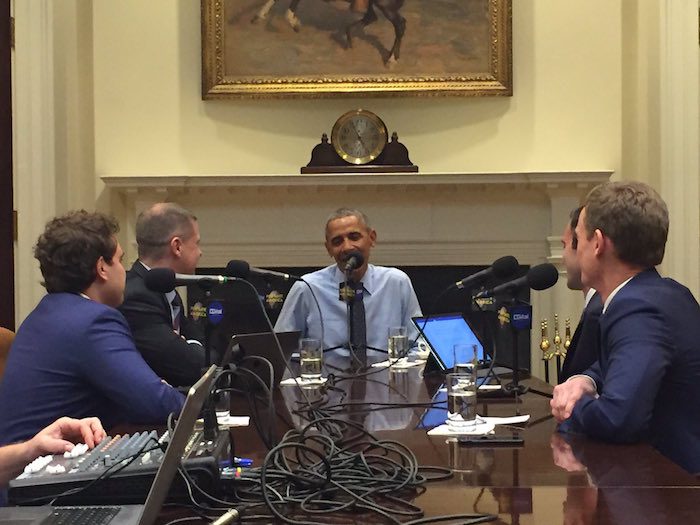
President Obama appeared on the latest episode of the new podcast Pod Save America, in what was billed as his last interview as president of the United States before Donald Trump’s inauguration on Friday. (Pod Save America is the new project from the Keepin’ It 1600 guys, former Obama staffers who broke from their podcast home at The Ringer and started the new media company Crooked Media partly in response to Trump’s election.)
In his final days in office, Obama has in a variety of contexts highlighted his views on the problematic ways news is distributed and consumed today — from calling out what he sees as the way social media bubbles have degraded our democracy to warning of the dangers of “fake news” stories.@jonfavs @Goldman44 how you guys managed to land that interview, I'll never know
— Christopher Hayes (@chrislhayes) January 19, 2017
“For too many of us, it’s become safer to retreat into our own bubbles, whether in our neighborhoods or on college campuses, or places of worship, or especially our social media feeds, surrounded by people who look like us and share the same political outlook and never challenge our assumptions,” he said in his farewell speech in Chicago on January 10. “The rise of naked partisanship, and increasing economic and regional stratification, the splintering of our media into a channel for every taste — all this makes this great sorting seem natural, even inevitable.”
Indeed, according to a Pew study released Wednesday, Clinton and Trump supporters relied on predominantly different news sources — but for 54 percent of voters surveyed, it was television, not online news sources, that served as their primary source of election news. (Fox News was the main campaign news source among 40 percent of Trump voters; sources were more varied among Clinton voters.)
Asked on Pod Save America what advice he would have given to his 2009 self just before taking office, Obama suggested that he should’ve devoted more effort to finding “new ways of communicating with the American people”:Obama also suggested that there may exist a different kind of “silent majority,” a group that’s “tired of being mad all the time, and would appreciate people listening to each other.” But he acknowledged that we’re far from building a “civic culture,” both in society and online, that allows for more effective policy building (with a little shoutout to NPR).I would tell him that you have to spend more time thinking about new ways of communicating with the American people. You can’t be so intimidated by the way things have always been done in the White House, because the communications landscape has been shifting…
As Lincoln said, with public opinion, there’s nothing you can’t do, and without it, there’s nothing much you can do. We were going to get clobbered in 2010, probably no matter what we did, just because on my watch people were really hurting. I’d think about how I got here and spend that same effort and energy touching people directly, instead of standing behind a podium and giving a bunch of grim lectures…that’s where the impression arose that Obama is really Spock-like.
I don’t have clean answers. Some of it is just technology-driven. If you have a phone, and you’re able to visit everything on the web with a touch of a button, you’re going to get into certain habits. You can lecture people about going to the site that makes your blood boil with which you completely disagree, which, you know, is hard to do, and you’re not going to get a huge amount of take-up, and it’s unrealistic to expect that people are just going to put their phones away and listen to NPR or other media that I might think is more balanced and more accurate.
On the other hand, my instinct is everybody hates media right now — everybody knows that the political culture doesn’t work. So that has to be an opportunity.